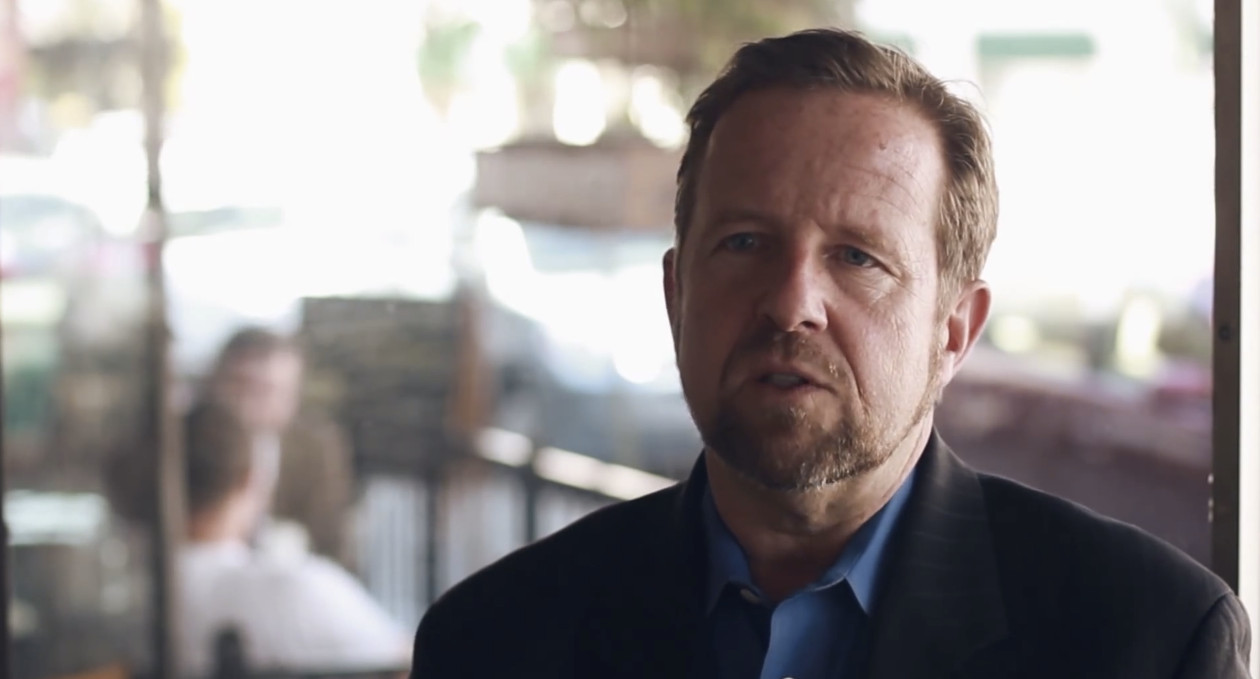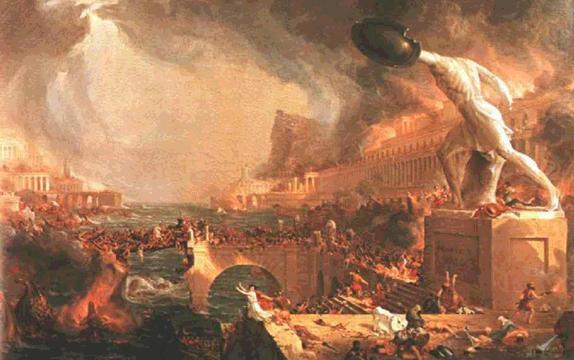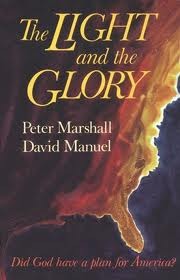Horton on Trump; Trueman on Evangelicals
 Thursday, March 17, 2016 at 07:27AM
Thursday, March 17, 2016 at 07:27AM 
Here's Michael's Christianity Today essay on Trump: Trump's "Theology"
Here's Trueman's essay on the state of evangelicalism: The Last Waltz
Both are must reads.
Living in Light of Two Ages
____________________________
 Thursday, March 17, 2016 at 07:27AM
Thursday, March 17, 2016 at 07:27AM 
Here's Michael's Christianity Today essay on Trump: Trump's "Theology"
Here's Trueman's essay on the state of evangelicalism: The Last Waltz
Both are must reads.
 Wednesday, December 9, 2015 at 09:17AM
Wednesday, December 9, 2015 at 09:17AM Another "must see" video? Yup, trust me, this is worth every seventeen minutes of your time. Although he is among the youngest in the Senate, Ben Sasse is the adult in the Senate chamber.
Watch this!
 Thursday, August 27, 2015 at 01:37PM
Thursday, August 27, 2015 at 01:37PM  From Allen Guelzo's recent essay in Did Religion Make the Civil War Worse? in The Atlantic.
From Allen Guelzo's recent essay in Did Religion Make the Civil War Worse? in The Atlantic.
If there is one sober lesson Americans seem to be taking out of the bathos of the Civil War sesquicentennial, it’s the folly of a nation allowing itself to be dragged into the war in the first place. After all, from 1861 to 1865 the nation pledged itself to what amounted to a moral regime change, especially concerning race and slavery—only to realize that it had no practical plan for implementing it. No wonder that two of the most important books emerging from the Sesquicentennial years—by Harvard president Drew Faust, and Yale’s Harry Stout—questioned pretty frankly whether the appalling costs of the Civil War could be justified by its comparatively meager results. No wonder, either, that both of them were written in the shadow of the Iraq War, which was followed by another reconstruction that suffered from the same lack of planning.
What kept the nation feeding an entire generation into the Civil War’s meat grinder, especially if the war’s endgame prospects were so unclear? The answer, in Stout’s version, was American religion. A war which began as a fairly colorless constitutional dispute over secession was transformed by a tidal wave of “millennial nationalism” into a crusade with no off switch. Faust flips the causal equation. If religion did not exactly drive Americans to war, then war drove Americans to religion as the justification for its lethally expensive costs. “The war’s staggering human cost demanded a new sense of national destiny,” wrote Faust, “one designed to ensure that lives had been sacrificed for appropriately lofty ends.” A nation guided by realpolitik knows when to cut its losses. A nation blinded by the moral gleam of a “fiery gospel writ in burnished rows of steel” and charmed by the eloquence of a president with an uncanny knack for making his assessment of political problems sound like the Sermon on the Mount, obeys no such limitations.
Guelzo concludes,
In exposing the shortcomings of religious absolutism, the Civil War made it impossible for religious absolutism to address problems in American life—especially economic and racial ones—where religious absolutism would in fact have done a very large measure of good. Some leaders, Martin Luther King prominent among them, have since invoked Biblical sanction for a political movement, but that has mostly been tolerated by the larger, sympathetic environment of secular liberalism as a harmless eccentricity which can go in one ear and out the other. “Never afterward,” wrote Alfred Kazin of the war, “would Americans North and South feel that they had been living Scripture.” I do not know that Americans have been the better for it.
 Thursday, February 26, 2015 at 02:55PM
Thursday, February 26, 2015 at 02:55PM  Who is watching Joel Osteen? Not I! But he does amaze me. How can he preach on the exact same topic every Sunday--"God wants me to be better"--and, yet make it seem different?
Who is watching Joel Osteen? Not I! But he does amaze me. How can he preach on the exact same topic every Sunday--"God wants me to be better"--and, yet make it seem different?
When it comes to Christian media, and who accesses it, the numbers are revealing. Who Is Watching TV or Listening to Christian Radio?
Only 8% of Americans admit to watching Christian television regularly--I'll bet the demographics here are interesting. Probably older women with blue hair, who live below the Mason-Dixon line, and east of Mississippi.
24% watch Christian TV "sometimes," 27% "rarely," and 40% "never."
Christian radio fares a tad worse. 10% listen "regularly," 17% "sometimes," 19% "rarely," 52% "never."
Podcast numbers are low (the media is new). 4% "regularly," 10% "sometimes," 11% "rarely," 72% "never."
The numbers also show that
- 67 percent of Americans never or rarely watch Christian-based programming on television. Those who do watch at least sometimes are overwhelmingly self-identified evangelicals (69 percent) and weekly churchgoers (62 percent).
- 71 percent never or rarely listen to Christian radio. Those who do are similar to the Christian TV crowd — 67 percent are evangelicals and 57 percent are weekly churchgoers.
- 84 percent of Americans never or rarely listen to Christian-themed podcasts. Books and movies fared slightly better: 33 percent said they at least sometimes read Christian-based books. And 40 percent report seeing a Christian movie in the last year.
 Wednesday, November 19, 2014 at 02:52PM
Wednesday, November 19, 2014 at 02:52PM 

Earlier this month, the Mormon Church officially acknowledged what the most ardent of Mormons did not know (or refused to believe); that Joseph Smith had at least forty wives.
According to a recent article in the The New York Times (a once reputable and respected publication),
Mormon leaders have acknowledged for the first time that the church’s founder and prophet, Joseph Smith, portrayed in church materials as a loyal partner to his loving spouse Emma, took as many as 40 wives, some already married and one only 14 years old.
The church’s disclosures, in a series of essays online, are part of an effort to be transparent about its history at a time when church members are increasingly encountering disturbing claims about the faith on the Internet. Many Mormons, especially those with polygamous ancestors, say they were well aware that Smith’s successor, Brigham Young, practiced polygamy when he led the flock in Salt Lake City. But they did not know the full truth about Smith.
If those outside the church found this revelation as confirmation of what was self-evidently true (that Smith made up Mormon doctrine as he went along--as in the case of "plural" marriage), it came as a real shock to the Mormon faithful who are used to the idealized image and life story of the Joseph Smith portrayed in the painting above. One life-long Mormon was especially taken aback by the revelation that Smith had as many as 40 wives, including a young teenage girl.
“Joseph Smith was presented to me as a practically perfect prophet, and this is true for a lot of people,” said Emily Jensen, a blogger and editor in Farmington, Utah, who often writes about Mormon issues.
She said the reaction of some Mormons to the church’s disclosures resembled the five stages of grief in which the first stage is denial, and the second is anger. Members are saying on blogs and social media, “This is not the church I grew up with, this is not the Joseph Smith I love,” Ms. Jensen said.
What makes the revelation of Joseph Smith actually practicing what he preached (plural marriage) so problematic is not that he had multiple wives, or even that he married a teenager (as bad as that was), but that he was sealed to other men's wives for eternity. The shock is not plural marriage, but what amounts to perpetual and eternal adultery.
The essay on “plural marriage” in the early days of the Mormon movement in Ohio and Illinois says polygamy was commanded by God, revealed to Smith and accepted by him and his followers only very reluctantly. Abraham and other Old Testament patriarchs had multiple wives, and Smith preached that his church was the “restoration” of the early, true Christian church.
Most of Smith’s wives were between the ages of 20 and 40, the essay says, but he married Helen Mar Kimball, a daughter of two close friends, “several months before her 15th birthday.” A footnote says that according to “careful estimates,” Smith had 30 to 40 wives.
The biggest bombshell for some in the essays is that Smith married women who were already married, some to men who were Smith’s friends and followers.
The revelation of Smith's other-shore eternal philandering presents major problems for Mormons because Joseph Smith did the very thing which church doctrine promulgated under his tenure as God's "prophet, seer, and revelator," expressly prohibits.
There remains one way in which polygamy is still a part of Mormon belief: The church teaches that a man who was “sealed” in marriage to his wife in a temple ritual, then loses his wife to death or divorce, can be sealed to a second wife and would be married to both wives in the afterlife. However, women who have been divorced or widowed cannot be sealed to more than one man.
I think it was Donald Grey Barnhouse who once quipped that you can always tell a false religion invented by a man--there will be sex (usually lots of it) in the afterlife. In this case, Joseph Smith not only "sealed himself" to multiple maidens and widows, but also to other men's wives.
I wonder what the husbands of these wives would have done, had they known the prophet was ogling their wives with less than honorable intentions, and was actively scheming to prevent them from enjoying their own eternal marital pleasures by stealing their wives for himself.
 Tuesday, September 16, 2014 at 10:39AM
Tuesday, September 16, 2014 at 10:39AM  One of the darkest chapters in American history is the brutal slaughter of nearly 150 members (including women and children) of the Baker-Fancher wagon train at Mountain Meadows, Utah, at the behest of Brigham Young.
One of the darkest chapters in American history is the brutal slaughter of nearly 150 members (including women and children) of the Baker-Fancher wagon train at Mountain Meadows, Utah, at the behest of Brigham Young.
Dr. Alvin Schmidt of Illinois College was a recent guest on Issues, Etc., discussing the Mountain Meadows Massacre, on September 11, 1857. Mountain Meadows Massacre
You can read more about the massacre here: Wikipedia Mountain Meadows Massacre
 Thursday, June 19, 2014 at 03:36PM
Thursday, June 19, 2014 at 03:36PM 
(Published here with the kind permission of Modern Reformation Magazine, Issue: "Zion" Nov./Dec. 2009 Vol. 18 No. 6 Page numbers: 25-28)
When an alien spaceship destroyed the White House in the 1993 science fiction film Independence Day, I'm told that pre-9/11 moviegoers were not horrified at the possibility and that some even cheered (perhaps because they were a bit cynical about the current occupant of the Oval Office). As the world's lone superpower, we believe there is no nation on earth that would dare invade our nation and occupy our territory. While terrorists may do great damage and cause huge loss of life (as they have done), from a strategic point of view, a terrorist strike is of little consequence when it comes to challenging the military and economic might of the United States. At this point in our history, the fall of the American Republic to a foreign adversary (space aliens aside) is unthinkable.
Similarly, the citizens of the Roman Empire once thought themselves invincible and therefore safe from invasion. That is, until a Visigoth general named Alaric led an army of Germanic tribes over the Alps into northern Italy. The audacity of Alaric's incursion into the heartland of the Roman Empire enabled him to quickly occupy much of northern Italy, before laying siege to the rest of the Italian peninsula to the south. It was not long before Alaric's army was outside the gates of the City of Rome. When Alaric's forces broke through the Eternal City's remaining defenses on August 24, A.D. 410, his men ransacked and looted the symbolic heart of the empire. Ironically, this "barbarian" army included a significant number of Arian Christians who did little damage to the churches in the city and minimal harm to orthodox Christians.
Spared from invasion for eight hundred years, the unthinkable had now happened: Rome had been sacked. How on earth did an army of barbarians pull off the impossible? History had come to a dramatic turning point, and everyone living at the time seemed to know it, even if they were not sure what this meant for their collective futures.
If Edward Gibbon's assessment is correct, the myth of Roman invincibility obscured the moral and economic rot (what Gibbon calls the loss of "civic virtue") that had eaten away much of the foundation of Roman society. Rome's battle-hardened armies were off guarding the far-flung territories of the empire. The empire's treasury was empty; and a government, which prided itself on providing both bread and entertainment for its citizens, had nothing left to give them when the barbarians finally came. In the wake of the unthinkable, all that remained was the blame game-how and why did the invincible empire come to such an ignominious end?
The purpose of this essay is to briefly consider how the Fall of Rome provoked different reactions from two prominent church fathers living at the time: St. Jerome and St. Augustine. Their response to Rome's fall serves as an object lesson for many American Christians, who may see the health and success of the American Republic as in some way connected to the success and vitality of the kingdom of God.
To read the rest of this article, click here: Jerome, Augustine and the Fall of Rome
 Thursday, May 1, 2014 at 07:27AM
Thursday, May 1, 2014 at 07:27AM  In his best selling 1977 book, The Light and the Glory: Did God have a plan for America?, Peter Marshall writes:
In his best selling 1977 book, The Light and the Glory: Did God have a plan for America?, Peter Marshall writes:
That a drought could be broken, or an Indian attack averted, by corporate repentance is an idea that sounds alien to many Christians today. Yet it was central to the faith which built this country, and is one of the most prominent, recurring themes in the Bible. One of the most familiar examples is, "If my people who are called by my name humble themselves, and pray and seek my face, and turn from their wicked ways, then I will hear from heaven, and will forigve their sin and heal their land" (2 Chronicles 7:14).
Accepting Marshall's untenable hermeneutic (he ignores the fact that God's "national" covenant was made with Israel only), it is quite common to hear well-intended Christians claim that America is a “Christian nation” and in doing so appeal to biblical passages such as that just cited by Marshall. Because our Lord’s promise of divine protection is given to the church (Matthew 16:18), the temptation is ever-present for Christians to mistakenly assume that our Lord’s promise of protection extends beyond the church they attend to the national interests and policies of the nation in which they live. God's plan for our nation properly falls under the category of "providence" not "covenant."
The claim that “God is on our side” often comes to fruition when politically active American evangelicals see themselves in a “culture war”–contending with secular-progressives for the soul of the nation. In the heat of battle, Christians invoke covenant promises made by God to Israel, thinking these promises apply to the United States because they mistakenly believe that the United States has some sort of covenant relationship with YHWH as did Israel. This tendency is one of the key indicators of the popular but erroneous assumption that American is a Christian nation because it was founded on “biblical principles” and therefore possesses a unique relationship to God, just as Israel did under the Old Covenant.
But America has no national covenant with God, as did Israel under the covenant God made with his chosen people at Mount Sinai. This fact presents a serious problem for those who assume that the promises God made to ancient Israel somehow apply to the United States. Covenant promises of blessing and curse which were given to Israel in a particular biblical context cannot be applied to contemporary political issues given the role such covenant blessings and curses played in Israel’s unique history.
One such example of applying these covenant promises to modern America can be found on the website for the National Day of Prayer, where we read the following (echoing the previous words of Peter Marshall):
Our goal is to see communities transformed across America. That happens one family at a time. We know lives are being changed. We see the reports and statistics everyday (read Answered Prayer). We pray in expectation knowing that God can and will make a difference if we seek Him, turn from our ways and repent (II Chronicles 7:14).
The stated desire of the national day of prayer is the transformation of communities and individuals. Biblical support is taken from 2 Chronicles 7:14. sadly, this passage is cited apart from any consideration of the redemptive-historical context in which the verse originally appears–the dedication of Solomon’s temple (2 Chronicles 6-7), specifically God’s private revelation to Solomon after the public manifestation of fire in the previous verses (2 Chronicles 7:1-3).
If America's founding fathers could repent and seek the face of God, as instructed by the Chronicler, so as to avoid drought or Indian attack, why shouldn't we? Marshall's plea has been heard by many. Those who see themselves in the midst of a culture war, or who are seeking a national revival, often affirm that if only God’s people living in America would act upon the covenant promises God made to Israel in 2 Chronicles 7:14, then God would spare our nation from some impending calamity–usually the election of some disagreeable political figure, or the passage of some worrisome piece of legislation, or a high court decision which is perceived to undermine Judeo-Christian values. If God made this promise to Israel during the days of Solomon, then he is still making this promise to Christians who live in America today. Right?
The invocation of 2 Chronicles 7:14, closely parallels warnings made by certain dispensationalists, who see the end-times centering around God’s program for national Israel. Biblical passages which speak of covenant blessings and curses coming upon Israel’s enemies (i.e., Genesis 12:3), are interpreted to mean that unless the United States support the modern nation of Israel (specifically in terms of the land promise given to the physical descendants of Abraham), America risks coming under God’s judgment. As one prominent evangelical in Congress contends,
I am convinced in my heart and in my mind that if the United States fails to stand with Israel, that is the end of the United States . . . [W]e have to show that we are inextricably entwined, that as a nation we have been blessed because of our relationship with Israel, and if we reject Israel, then there is a curse that comes into play. . . . We believe very strongly the verse from Genesis [Genesis 12:3], we believe very strongly that nations also receive blessings as they bless Israel. It is a strong and beautiful principle [From a speech given by Congresswoman Michele Bachman in February 2010 to the Republican Jewish Coalition].
Although it is believed that God’s promise to those who protect Israel applies primarily to matters of the on-going Israeli-Palestinian conundrum, biblical passages referring to Israel (or to Abraham) under the Old Covenant are applied to contemporary events without the slightest hesitation. In light of Israel’s quite unique role in redemptive history, this kind of application should give us great pause.
If by “Christian nation” we mean that America has some sort of theological charter or covenant with God as set forth in a biblical passage such as 2 Chronicles 7:14, we are sadly mistaken. 2 Chronicles 7:14 applied to Israel in the days of Solomon when God’s glory filled the temple he had just dedicated to YHWH. Passages such as this one are invoked the way they are because of a serious theological misunderstanding–the confusion of promises made regarding the kingdom of God with God’s providential purposes for the civil kingdom. Unless we are willing to rip the passage from its context, it cannot be invoked as a promise applying to modern America. In terms of our national relationship to God, America is every bit as “secular” as is Saudi Arabia, Iran, China, or even Israel, for that matter. America is not a divinely-ordained theocracy with either national promises or threatened curses as was true of Israel.
The reality is that the promise found in 2 Chronicles 7:14 has nothing whatsoever to do with a national revival or the current fortunes of the United States. It has everything to do with the dedication of Solomon’s temple nearly 3000 years ago.
 Monday, April 28, 2014 at 11:01AM
Monday, April 28, 2014 at 11:01AM Sunday Morning (May 4, 2014): As we draw near to the end of our series on the Gospel of John, we are now working our way through the post-resurrection appearances of Jesus. We will be considering John 20:30-21:14.
Sunday Afternoon: I am continuing my series on the Canons of Dort. We are covering the third/fourth head of doctrine, article 5 which deals with the inadequacy of the law to save. The catechism service begins @ 1:15 p.m.
Wednesday Night Bible Study (Aptil 30, 2014): In our "Studies in the Book of Revelation," we are covering Revelation 17 and Babylon the Great. Bible Study begins at 7:30 p.m.
Friday Night Academy (May 2): We return to our series "In the Land of Nod" dealing with the two kingdoms. This week, we'll be considering two important biblical texts which relate to our topic: Romans 13:1-7 and Mark 12:13-17.
If you wish to catch-up and review the previous lectures in this series, you can find them here: Audio of Academy Lectures
For more information and directions, check out the Christ Reformed website: Christ Reformed Church
 Thursday, April 24, 2014 at 02:08PM
Thursday, April 24, 2014 at 02:08PM  Rod Dreher's recent essay, "Sex After Christianity" is a must read (Sex After Christianity).
Rod Dreher's recent essay, "Sex After Christianity" is a must read (Sex After Christianity).
Dreher points out that
The magnitude of the defeat suffered by moral traditionalists will become ever clearer as older Americans pass from the scene. Poll after poll shows that for the young, homosexuality is normal and gay marriage is no big deal—except, of course, if one opposes it, in which case one has the approximate moral status of a segregationist in the late 1960s.
He concludes,
Gay marriage signifies the final triumph of the Sexual Revolution and the dethroning of Christianity because it denies the core concept of Christian anthropology. In classical Christian teaching, the divinely sanctioned union of male and female is an icon of the relationship of Christ to His church and ultimately of God to His creation. This is why gay marriage negates Christian cosmology, from which we derive our modern concept of human rights and other fundamental goods of modernity. Whether we can keep them in the post-Christian epoch remains to be seen.
 Equally important is Peter Jones' response to Dreher's essay (A Response to Rod Dreher). Dr. Jones contends
Equally important is Peter Jones' response to Dreher's essay (A Response to Rod Dreher). Dr. Jones contends
The homosexual agenda is silencing every memory of behavior, speech, religious conviction, and public policy that reminds people that heterosexuality is the God-created norm for human sexuality. Anyone who adheres to such a heterosexual norm dares say so only at the risk of being arrested for discriminatory bullying.
He adds,
This old Western "Christian" world is indeed "coming apart" and in its place rises a "new world" of multi-sexual liberation, systematically promoted by both an ideological pagan Oneism and a determined elimination of the binary structure of theistic Twoism, which Scripture teaches is the way the world was made. Many in evangelicalism fail to see or refuse to see what is going on. Their superficial solutions only compound the problems.
